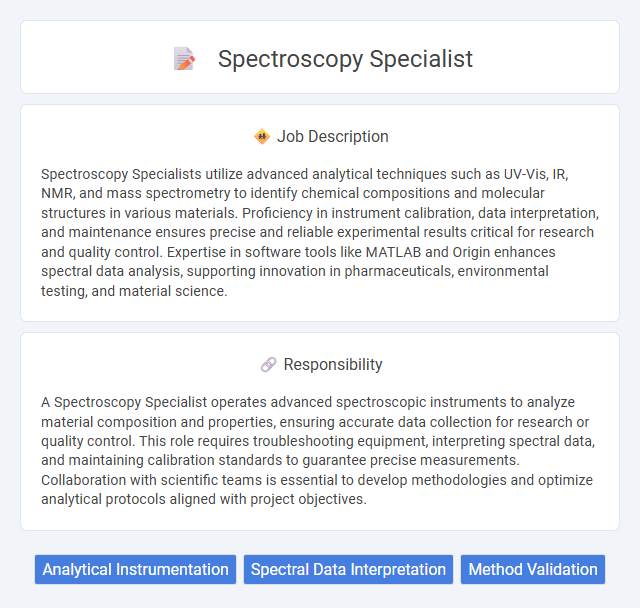
Spectroscopy Specialists utilize advanced analytical techniques such as UV-Vis, IR, NMR, and mass spectrometry to identify chemical compositions and molecular structures in various materials. Proficiency in instrument calibration, data interpretation, and maintenance ensures precise and reliable experimental results critical for research and quality control. Expertise in software tools like MATLAB and Origin enhances spectral data analysis, supporting innovation in pharmaceuticals, environmental testing, and material science.
Individuals with a strong analytical mindset and attention to detail are more likely to excel as Spectroscopy Specialists, given the precision required in interpreting spectral data. Those who possess patience and good problem-solving skills may find this role suitable, as it often involves troubleshooting complex instrumentation and processes. Candidates prone to stress in highly technical environments might find the job less aligned with their strengths.
Qualification
A Spectroscopy Specialist typically requires a strong background in chemistry, physics, or materials science, often holding a bachelor's or master's degree in these fields. Proficiency in various spectroscopic techniques such as NMR, IR, UV-Vis, and mass spectrometry is essential for analyzing material properties and identifying chemical compositions. Experience with data analysis software and laboratory instrumentation calibration further strengthens qualifications for precision and reliability in experimental results.
Responsibility
A Spectroscopy Specialist operates advanced spectroscopic instruments to analyze material composition and properties, ensuring accurate data collection for research or quality control. This role requires troubleshooting equipment, interpreting spectral data, and maintaining calibration standards to guarantee precise measurements. Collaboration with scientific teams is essential to develop methodologies and optimize analytical protocols aligned with project objectives.
Benefit
Working as a Spectroscopy Specialist likely offers opportunities for cutting-edge research and access to advanced analytical instruments, enhancing technical expertise. The role probably provides career growth potential in various industries, including pharmaceuticals, environmental science, and materials engineering. Employees may benefit from collaboration with multidisciplinary teams, fostering innovation and professional development.
Challenge
The role of a Spectroscopy Specialist likely presents challenges related to interpreting complex spectral data accurately and maintaining precision in measurements under varying experimental conditions. Navigating advancements in spectroscopy technology may require continuous learning and adaptation to new methods and instruments. Problem-solving skills are probably essential to troubleshoot equipment issues and optimize experimental protocols for reliable results.
Career Advancement
Spectroscopy specialists gain expertise in analyzing materials through advanced spectroscopic techniques, enhancing their value in research and industrial settings. Mastery of methods such as UV-Vis, IR, NMR, and mass spectrometry enables career progression into roles like senior analyst, lab manager, or R&D project leader. Continuous skill development and certification in emerging spectroscopic technologies significantly boost opportunities for leadership positions and specialized consultancy roles.
Key Terms
Analytical Instrumentation
Spectroscopy specialists expertly operate and maintain advanced analytical instrumentation such as UV-Vis, FTIR, and NMR spectrometers to characterize chemical substances and materials. They utilize precise calibration techniques and data interpretation methods to ensure accurate spectroscopic analysis critical for quality control and research development. Proficiency in analytical software and adherence to laboratory safety and compliance standards are essential for effective spectroscopy applications in pharmaceutical, environmental, and industrial settings.
Spectral Data Interpretation
A Spectroscopy Specialist expertly analyzes spectral data to identify chemical compositions and molecular structures, utilizing techniques such as UV-Vis, IR, NMR, and mass spectrometry. Proficiency in spectral data interpretation enables accurate detection of material properties and aids in research, quality control, and product development across pharmaceuticals, materials science, and environmental analysis. Advanced skills in software tools and data modeling ensure precise spectral deconvolution and result validation.
Method Validation
Method validation in spectroscopy specialist roles ensures the accuracy, precision, and reliability of analytical techniques used for qualitative and quantitative analysis. Specialists develop and optimize protocols to verify instrument performance, detect potential errors, and comply with regulatory standards such as FDA, ICH, and ISO. Expertise in statistical analysis, calibration, and documentation is critical to establishing validated methods that support quality control and research objectives.
 kuljobs.com
kuljobs.com